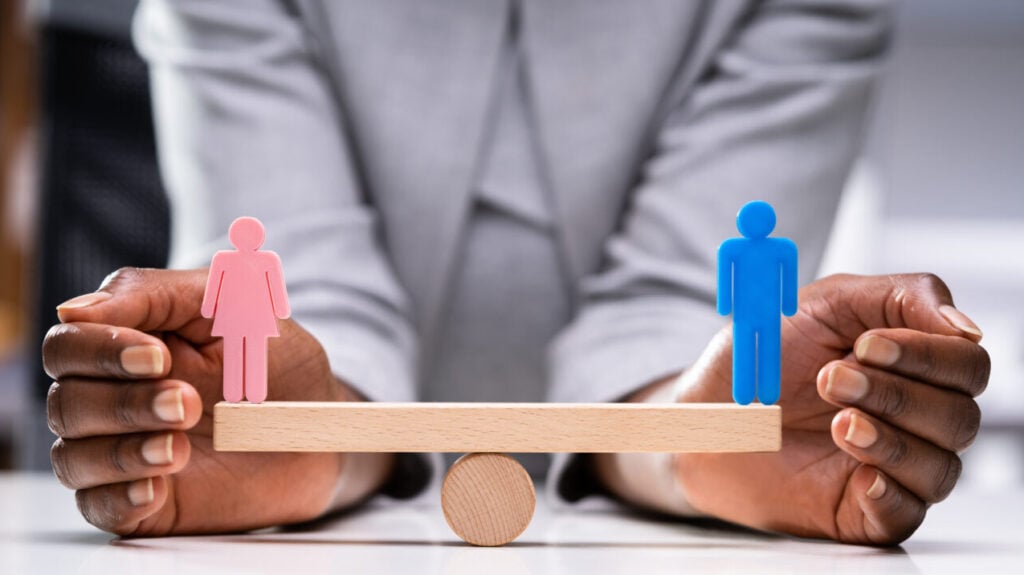Pay equity for Black women remains a challenge due to ‘occupational segregation,’ says Biden official
EXCLUSIVE: Black women missed out on $39.3 billion in 2019 alone, says U.S. Labor Department’s Wendy Chun-Hoon who runs the agency’s Women’s Bureau.
President Joe Biden, Vice President Kamala Harris, members of Congress, and administration officials convened on Tuesday to commemorate Equal Pay Day – a day highlighting the need to ensure that women are paid as much as their male counterparts.
Despite improvements to the earnings of women, Equal Pay Day continues to be not so equal when you get into the weeds of it all.
Wendy Chun-Hoon, director of the Women’s Bureau at the United States Department of Labor, told theGrio that the non-traditional jobs are where women find parity financially but noted that it’s difficult for them to remain in those jobs due to sexism, racism and other factors.
“This is an unfortunate thing,” said Chun-Hoon, “really we are 74 days into the new year and women’s wages are only catching up to what men were paid at the end of last year. So essentially that amounts to 83 cents on the dollar, and that math doesn’t add up.
She added, “For women of color, specifically for Black women, Latinas, these gaps are 64 cents on the dollar and 57 cents on the dollar. So math is definitely not adding up.”
(Photo: Adobe Stock)
The Labor Department has created the “Good Jobs” initiative in hopes of creating sustainable jobs over the next decade, including in transportation, construction jobs, and even broadband. These are the jobs believed to offer family-sustaining wages and benefits, and in some instances, are supported by unions.
As the Biden administration works on equity and inclusion, Chun-Hoon said the Labor Department wants to “make sure that women and women of color are in those jobs.”
However, even when women of color get these jobs, success is not guaranteed. Chun-Hoon acknowledged a major negative finding from a Labor Department study of women and their pay is “occupational segregation.”
“There is a heavy price to pay for occupational segregation. It costs Black women $39.3 billion in 2019,” she told theGrio, noting that those figures were from just before the start of the COVID-19 pandemic in 2020.
“For Hispanic women, $46.7 billion. So that is the cost of occupational segregation,” said Hoon.
There is a deeper reason for this racial disparity, according to Chun-Hoon.
She explained, “Basically it means that women are overrepresented in certain jobs and they’re underrepresented in certain jobs. The jobs that women are overrepresented in are some of the lower valued, least valued, undervalued is what we say in the report.”
“Jobs in our economy, these same jobs, which we know women of color are working in, were the jobs that took the hardest hits during COVID. So we’re talking restaurant jobs, retail jobs, even education jobs. When everything shuttered, folks lost their jobs. So that is also part of the reason why things are so disproportionately bad for women, but specifically women of color.”
(Credit: Adobe Stock)
This issue of occupational segregation perpetuates the United States’ poverty numbers, particularly for minority women. For Black women, statistics show they are leading as the head of household and the breadwinner.
According to the Center for American Progress, “The highest rates of poverty are experienced by American Indian or Alaska Native (AIAN) women, Black women, and Latinas. About 1 in 4 AIAN women live in poverty—the highest rate of poverty among women or men of any racial or ethnic group.”
During her remarks at Tuesday’s summit, Vice President Harris said that in addition to the work the White House is doing to close the gender pay gap, American companies should conduct pay audits on how they are paying women employees and urged them to be “transparent about the results.”
The Labor Department is already directing federal contractors to do just that. “Pay transparency creates accountability,” she said, “And accountability — well, that drives progress.”
TheGrio is now on your TV via Apple TV, Amazon Fire, Roku, and Android TV. Also, please download theGrio mobile apps today!”
The post Pay equity for Black women remains a challenge due to ‘occupational segregation,’ says Biden official appeared first on TheGrio.

